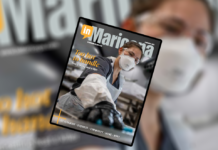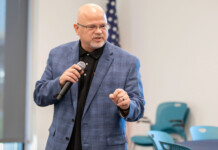
I have lived in Maricopa for more than two years. Through that time I have had the opportunity to witness a burgeoning city hindered by what I perceive to be waste, nepotism, and a misguided notion about the role of government.
Over the past two years, I have read stories that made me angry, whether it was a story about paying $500,000 to replace software that was replaced two years previous, or a multimillion dollar transit system that services one-tenth of 1 percent of the population. In the last several months, I have dedicated myself to delving a little deeper into the machinations of our municipality.
The problems I have noticed are truly a microcosm of the problems that face our nation, and it boils down to a bloated, crony-operated government that has concentrated its efforts to grow in scope and authority in service to the bureaucracy of government itself.
I have learned that we have earmarked $50 million to build a grand 40,000-sqare-foot city hall, an 11,000-square-foot police department, and an aquatics center in a city where large percentage of the homes already have pools. That’s more than $1,162 from every man, woman and child in Maricopa — just for construction — not including maintenance and operation costs in perpetuity, nor the interest paid on the bonds sold to raise the money in the first place.
These are three projects that will never be self-sustaining and will forever be a financial burden on the city’s property and business owners, and tax base, in general. These facilities will only benefit a very small, exclusive minority, and standing to benefit most of all is the city’s administration, their employees, and the growth, thereof.
Wouldn’t a grade separation at the railroad tracks benefit the citizens and economy of Maricopa exponentially more than an expensive, unproductive, government complex situated on one of the most prime pieces of commercial real estate in the city? Instead, the council paid almost $100,000 to a lobbying firm to wine and dine some D.C. bureaucrat in hopes that we get the money for the grade separation, and are pushing full steam ahead with their new digs.
I have also learned the city has opened up yet another new department — the department of Economic Development. It’s a new bureaucracy that will supposedly plan and manage the economic development of the city and the economic futures of its inhabitants by courting/promoting specific businesses while giving no preference to the rest. In order to qualify for “incentives” offered for business development, you must plan to hire at least 20 people, or you must be starting a business in a “preferred” industry.
So basically, if you're a “mom and pop” operation trying to open up a small business-you can kick rocks, as far as the city is concerned. They’re strictly interested in “green jobs” and big corporate players. The funny thing is, most of the “incentives” offered by the city consist of the alleviation of the usual bureaucratic red tape. In other words, the government tries to be the less burdensome to the development of “preferred” businesses.
So while the city spends hundreds of thousands, if not millions of dollars, creating new departments, hiring consultants and advisers, and funding studies and grants to figure out how to stimulate the economy, the true answer is one they obviously already know but do not want to acknowledge. Thomas Jefferson once said, “A wise and frugal government, which shall leave men free to regulate their own pursuits of industry and improvement, and shall not take from the mouth of labor the bread it has earned — this is the sum of good government.”
The true answer to stimulating the economy and enhancing the lives of the average citizen is for the city government to simply get out of the way and get its grubby hands out of the peoples’ collective pockets. Lower the barriers to business, whether it be property taxes or licensing fees, sales taxes, usage fees, inspection fees and regulatory fees. All these costs of doing business are passed down to the consumer, driving up the price of the desired good or service.
Lower property taxes also help homeowners by lowering their mortgage, and attracting new residents with the appeal of low, long-term costs of living. It also helps renters, both commercial and residential, because the landlord’s mortgage goes down as well.
Lowering or eliminating these burdens puts more money into the consumer’s pocket, able to be spent on goods and services they actually desire. Lower sales taxes provide incentive for shoppers to come in from outside of Maricopa because lower cost of goods. Lower barriers and regulations to starting a business encourage entrepreneurs to invest in businesses desired by a market flush with funds not extorted through taxes.
Unfortunately, none of these proposals will be acceptable to the current leadership because it means a direct challenge to the burgeoning bureaucracy’s health and influence. They will claim the cuts would jeopardize the well being of the people, and that their needs represent the peoples’ needs. The prevailing attitude seems to be, as long as government dines well, the citizens are fed.
I believe the waste of taxpayer dollars and the growth of big government plagues the city’s residents and businesses like a cancer. It feeds on healthy sectors of the economy: the homeowners, the consumers, the merchants, the producers, and the laborers, and then excretes big-salaried department heads and their throngs of well-paid, paper-pushers, and an army of well-equipped enforcers, who then get to retire on the taxpayer’s dime, even if they only work part-time. All the while, the list of regulations and pet projects gets longer and longer, begging the need for more taxes, more paper pushers and more enforcers. It’s a never-ending circle of madness and tyranny and I want it to stop. That is why I am running for city council.
I will not vote to spend the taxpayers’ money to benefit the few. I will not vote for projects and services that promote the increased scope of government and adventurism with money forcibly removed from the pockets of homeowners, business owners, workers, and consumers. I will support infrastructure projects that serve a true need in the community and that will directly contribute to the happiness, commerce, and safety of its citizens. These needs include roads, traffic signals, street lights, and sidewalks, and the maintenance, thereof.









![Alleged car thief released without charges Phoenix police stop a stolen vehicle on April 20, 2024. [Facebook]](https://www.inmaricopa.com/wp-content/uploads/2024/04/IMG_5040-218x150.jpg)





